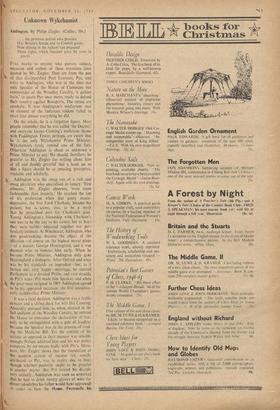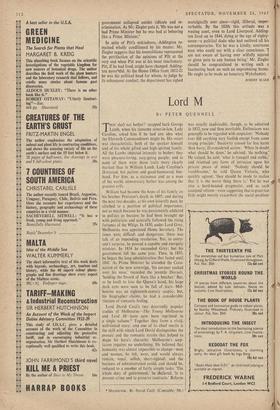Unknown Wykebamist
Addington. By Philip Ziegler. (Collins, 50s.)
. . . the generous patriot who presides O'er Britain's Senate and its Council guides Now shining in the radiant van prepared Those rights, which freedom gave, by arms to
guard.
FULL, marks to anyone who guesses subject, occasion and author of these atrocious lines quoted by Mr. .Ziegler. They are from the pen of that distinguished Poet Laureate, Pye, and refer to Addington, who, was at the time • not only Speaker of the House of Commons but commander of the Woodley Cavalry, 'a gallant train,' to quote Pye once more, ready to defend their country against Bonaparte. The verses are symbolic. It was Addington's misfortune that an element of the ludicrous seldom failed to enter into almost everything he did.
On the whole, he is a forgotten figure. Most people remember that he was called 'the Doctor,' and everyone knows Canning's malicious rhyme with Paddington. Fewer, perhaps, are aware that he is the only Wykehamist Prime Minister. Wykehamists rarely remind one of the fact. 'Otherwise Addington is about as unknown a Prime Minister as any. We should, therefore, be grateful to Mr. Ziegler for writing about him at all and doubly grateful that a book on so dim a figure should be so amusing, perceptive, readable and scholarly.
• Addington was the smug son of a rich and smug physician who specialised in lunacy. 'Few ailments,' Mr. Ziegler observes, 'were more fashionable than insanity.' He reached the top of his profession when that gouty manic- depressive, the first Lord Chatham, became his Patient, but it. seems, alas, to be a myth that he prescribed port for Chatham's gout. Young Addington's friendship with Chatham's son was to be the key to his career, but as boys they were neither educated together nor par- ticularly intimate. At Winchester, Addington, who was good-looking, became the object of the affection—of course on the highest moral plane --of a master, George Huntingford, and it was deemed wise to remove him early. When he became Prime •Minister, Addington duly gave Huntingford a bishopric. After Oxford and what was by his standards an imprudent—but, as it turned out, very happy—marriage, he entered, Parliament as a devoted Pittite, and rose steadily in Pitt's wake. Pitt made him Speaker, and when the great man resigned in 1801 Addington agreed to be his approved successor, the first unequivo- cally middle-class Prime Minister.
It was a fatal decision. Addington was a feeble debater and a sitting duck for wits like Canning.
Absurdity pursued him, as when, dressed in the
full uniform of the Woodley Cavalry, he entered the House to announce the declaration of war, only to be extinguished with a gale of laughter
because the Speaker was in the process of read- ing the Medicine Bill. Yet the content of his
actions as opposed to their manner was sensible enough. Nelson admired' him, and his war polic■ vonmares by no means badly with Pitt's. More- over, Mr. Ziegler shows that the foundation of the modern system of income tax; usuall) attributed to Pitt, was in reality due to him: though whether posterity might to be grateful is another matter. But Pitt treated his disciple very unfairly. Addington was soon so unnerved that he had to drink twenty glasses of wine for dinner (doubtless his father would have approved) in order to face the House. Eventually his
government collapsed amidst ridicule and re- crimination. As Mr. Ziegler puts it, 'He was not a bad Prime Minister but he was bad at behaving like a Prime Minister.'
In spite of Pitt's unkindness, -Addington re mained wholly conditioned by his master. Mr. Ziegler suggests that his immobilisme represented the petrifaction of the opinions of Pitt at the very end when Pitt was at his most reactionary. Pitt, if he had lived, might have changed. Adding- ton never did. At the Home Office from 1812-21 he was the political head for whom, to judge by its subsequent conduct, the department has sighed nostalgically ever since—rigid, illiberal, imper- turbable. By the 1820s this attitude was a waning asset, even to Lord Liverpool. Adding- ton lived on to 1844, dying at the age of eighty- seven—a political dodo who had outlived all his contemporaries. Yet he was a kindly, courteous man who could say with a clear conscience, "I am not aware of having ever wilfully injured or given pain to any human being.' Mr. Ziegler should be congratulated in writing such a fascinating book on such an unpromising theme. He ought to be made an honorary Wykehamist.
ROBERT BLAKE



















































 Previous page
Previous page